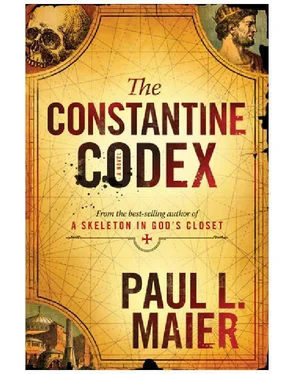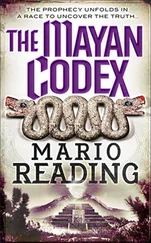Paul Maier - The Constantine Codex
Здесь есть возможность читать онлайн «Paul Maier - The Constantine Codex» весь текст электронной книги совершенно бесплатно (целиком полную версию без сокращений). В некоторых случаях можно слушать аудио, скачать через торрент в формате fb2 и присутствует краткое содержание. Жанр: Триллер, на английском языке. Описание произведения, (предисловие) а так же отзывы посетителей доступны на портале библиотеки ЛибКат.
- Название:The Constantine Codex
- Автор:
- Жанр:
- Год:неизвестен
- ISBN:нет данных
- Рейтинг книги:5 / 5. Голосов: 1
-
Избранное:Добавить в избранное
- Отзывы:
-
Ваша оценка:
- 100
- 1
- 2
- 3
- 4
- 5
The Constantine Codex: краткое содержание, описание и аннотация
Предлагаем к чтению аннотацию, описание, краткое содержание или предисловие (зависит от того, что написал сам автор книги «The Constantine Codex»). Если вы не нашли необходимую информацию о книге — напишите в комментариях, мы постараемся отыскать её.
The Constantine Codex — читать онлайн бесплатно полную книгу (весь текст) целиком
Ниже представлен текст книги, разбитый по страницам. Система сохранения места последней прочитанной страницы, позволяет с удобством читать онлайн бесплатно книгу «The Constantine Codex», без необходимости каждый раз заново искать на чём Вы остановились. Поставьте закладку, и сможете в любой момент перейти на страницу, на которой закончили чтение.
Интервал:
Закладка:
“Pleasant fellow indeed! Still, you do seem to have a good hunch as to the identity of these bones. And if so, why aren’t you telling me? Remember, you started hinting with that word earlier.”
“You don’t miss a thing, do you, Dr. Ted?”
“Aw, c’mon, Jon. How about a little hint?”
“Can you keep a confidence?”
“Of course.”
“The bones are probably part of… a skeleton in Rome.”
Dr. Theophil Samuel thought for a moment, then shook his head. “I’ll need more than that,” he said. Clearly the eminent radiologist was hardly an expert in the early church.
“Best I can do, Ted. When it’s time for the news to break, you’ll be the first to know. I promise. But thanks for your help. It was… more strategic than you may realize.”
“Anytime.”
Again, every last clue only further identifies the remains, Jon thought on the way back to his office.
Now there was strong material evidence indeed, despite the theft of the codex, evidence of an extraordinary nature. “Isn’t this all we really need, Jon?” Shannon asked when she saw him clenching his fist at mention of the missing codex. “We have every word, for goodness’ sake. We can publish exact facsimile copies of the codex-even in the exact colors to match the ink of the lettering and the tan of the vellum on which it’s written. All the scholars working on the codex are content with black-and-white facsimiles, which are actually clearer than the codex itself. Fact is, we don’t even need the codex anymore.”
“Lots of truth there,” Jon admitted. “But we’re treading sacred ground here. It’s almost like tampering with God’s Word and the faith of believers to suggest, in effect, ‘Hey, your Bible has been fine up to now, but we have several necessary improvements.’ Without the genuine article, I’m afraid that copies will simply not convince them.”
“Maybe, maybe not. Anything more from the CIA on their search for the codex?”
“Only this: Dillingham learned that three of the men who were on duty at the airport security line the morning Bartholomew and his party took off are members of Islam Forever, a far-right religious party in Turkey. Whether or not that’s significant, no one knows at this point, but I think it could be very important. The switch had to have been made at the Istanbul airport.”
“But why go to all that trouble making a crude replacement? Why didn’t they simply take the codex and run?”
“Can you imagine the huge fuss the patriarch would have made when the attache case came out of the scanner much lighter than before? Of course, that could have happened anyway had he opened the codex after it exited the scanner. But they played their chances, and it gave them enough lead time to make off with the codex. Or maybe pass it on to others.”
Earlier, Dillingham had asked Jon for help on a watermark the CIA labs had discovered on the foolscap paper. Instead of a literal cap with bells attached to its flaps in the headgear of a medieval court jester-the origin of foolscap after all-the consistent watermark looked like a crescent and star over an earth surface with the Star of David and a cross embedded in dust. Such a logo was obvious, and both Jon and Osman al-Ghazali quickly translated it: Islam victorious over Judaism and Christianity.
Could it help identify the perpetrators? “Unfortunately it’s not a big clue,” Dillingham told Jon. “The paper is manufactured in Egypt, but it’s used throughout the Middle East.”
“But this had to be an inside job, Mort,” Jon said, giving the privileged appellation a test run. “Else how could the perpetrators know when the patriarch was coming through the security line and, above all, the exact dimensions of the codex for their copy?”
“That’s clear,” he agreed. “For some time now, our operatives in Istanbul have been using the Orthodox Patriarchate as their second home, checking out every last person on the staff there.”
“They have? I hope they aren’t disrupting the business of the patriarchate now that Bartholomew has returned.”
“Quite the opposite. Bartholomew is just as eager as you to locate the codex. He’s cooperating in every way possible.”
Jon thought of another tack. “Has anyone received a… any kind of a ransom note for the codex? We haven’t. Has Bartholomew?”
“No, not that I’ve heard.”
“Well, where do things stand as of now? What are your plans?”
“We’re doing a stronger background check on the three religious party members at the airport security line. Our Turkish counterparts are a big help-all secularists, thank goodness.”
“Good move. And… thanks for all your continuing help, Mort.”
“Not at all, Jon. I’m still trying to make up for that tongue-lashing I gave you some weeks ago.”
“Aw, don’t worry about that,” he said.
Jon received regular updates, assuring him that the Constantine Codex and Canon committees of the Institute of Christian Origins were working with a near-maniacal drive to complete the opening scholarship on both documents. Slogans like “Urgency, Security, Action” had proven quite unnecessary in urging them on, so very extraordinary was the excitement associated with the Constantine Codex.
Computer studies of the material proved most helpful. The Gospel of Mark was programmed for grammar, syntax, vocabulary, and favorite phraseology, as was the book of Acts. The newly discovered texts were then subjected to the same programming with stunningly similar results. The immediately adverb, so typical of Mark, appeared also in the new ending, which had no mention whatsoever of those clearly embarrassing references to snake-handling and drinking poison that showed up in later attempted conclusions to the Gospel and had always been regarded as spurious by the best scholarship. Jon and Shannon found it particularly pathetic that several cults in Kentucky and Tennessee made this central in their worship.
Similarly, just as computer studies had shown the book of Acts to have been written by the same hand as Luke’s Gospel, so the same hand was demonstrated in First and Second Acts. Above all, not a single verse in any of the newly discovered material conflicted in any way with the existing biblical text.
Should the newly discovered texts become part of the Bible? The Canon committee had been asked to explore that question, but it was quite divided on the issue. Jon and Shannon concluded that it was still too early to venture much of a working plan for that group.
Perhaps the greatest of all wonders in the entire enterprise was that confidentiality seemed to be holding. In Rome, no one had noticed the plugged one-inch circular hole in the lid of the St. Paul sarcophagus, according to a communication from Kevin Sullivan, although Benedict XVI was constantly inquiring about Jon and the codex.
In Cambridge, the only slight breach in security seemed to be the day that Zachary Alexander, an Associated Press stringer in Boston, came to Jon’s office to inquire about “some important document” he was supposed to have discovered somewhere in Turkey after the debate at Hagia Sophia and then delivered to the Ecumenical Patriarchate in Istanbul. Even as his heart nearly froze in midbeat, Jon affected a forced smile and asked the man where in the world he had heard such a thing.
“My cousin Brett has the AP desk in Istanbul,” Alexander said, “and he wanted an interview with the patriarch because of all the in-and-out traffic there after you left.”
“And did the patriarch grant it?”
“No, he didn’t. It was Brett’s guess that some old manuscript-or whatever-was involved.”
While a “white lie” of denial might have been justified at this point, Jon tried redirection instead. “It was my wife Shannon who found an old document at Pella, which really isn’t all that important. But she’d prefer no publicity on it until she’s done the usual translation and commentary.”
Читать дальшеИнтервал:
Закладка:
Похожие книги на «The Constantine Codex»
Представляем Вашему вниманию похожие книги на «The Constantine Codex» списком для выбора. Мы отобрали схожую по названию и смыслу литературу в надежде предоставить читателям больше вариантов отыскать новые, интересные, ещё непрочитанные произведения.
Обсуждение, отзывы о книге «The Constantine Codex» и просто собственные мнения читателей. Оставьте ваши комментарии, напишите, что Вы думаете о произведении, его смысле или главных героях. Укажите что конкретно понравилось, а что нет, и почему Вы так считаете.












